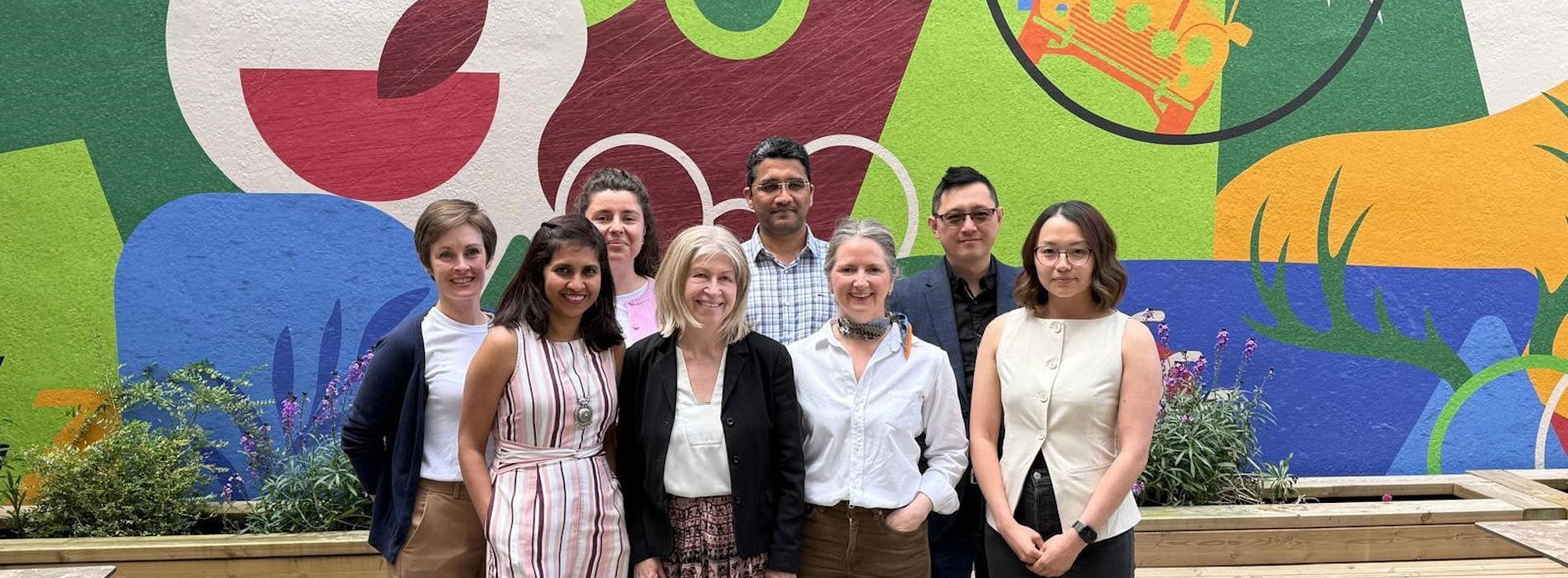These clinically diverse inherited disorders can arise from mutations in a number of different genes (see below).
The service is funded by the National Commissioning Group (NCG, formerly the National Specialist Commissioning Advisory Group), as part of the Diagnostic and Advisory Service for Rare Neuromuscular Disorders.
Oxford University Hospitals' Neuromuscular Services have been recognised as a European Rare Neuromuscular Centre.
Diagnosis and management advice
These depend on a combined approach incorporating:
- clinical assessment
- specialised electromyography
- analysis of DNA/genetic testing
- analysis of serum antibodies (including live CBA)
- outpatient or inpatient evaluation of specific therapies.
Gene screening
Currently we are able to screen for mutations in the following ways.
- National Genomic Test Directory (NGTD) R80 Gene Panel: List of 27 genes included in the targeted R80v5.0 Congenital Myasthenic Syndrome panel. Read depth coverage (% at 20X) is held by the laboratory and can be obtained if required.
AGRN; ALG2; ALG14; CHAT; CHRNA1; CHRNB1; CHRND; CHRNE; CHRNG; COL13A1; COLQ; DOK7; DPAGT1; GFPT1; GMPPB; LRP4; MUSK; MYO9A; PLEC; RAPSN; SCN4A; SLC18A3; SLC25A1; SLC5A7; STT2; TOR1AIP1; VAMP1
- CHRNA, CHRNB, CHRND and CHRNE - the genes encoding the muscle acetylcholine receptor (AChR)
- RAPSN - responsible for clustering AChR at the neuromuscular junction (NMJ)
- COLQ - which anchors acetlycholinesterase at the NMJ
- CHAT - choline acetlytransferase involved in the synthesis of acetylcholine
- DOK7 - involved in clustering AChR and maintaining NMJ structure
- CHRNG - the fetal AChR gamma subunit in which mutations can cause Escobar's syndrome (screening is on a research basis at present - but will shortly be transferred to the CPA accredited laboratory)
- MUSK - the gene for muscle specific tyrosine kinase can also be screened on a research basis.
2. Whole exome sequencing/gene screen: in research unit where appropriate.
3. Where novel mutations are identified we are developing an increasing repertoire of functional analyses to confirm their pathogenicity.
4. Owing to the heterogeneity of these disorders, and because clinical evaluation can inform the genetic screening, we recommend that all patients attend for clinical assessment.
DNA or blood samples for screening
1-4 mls blood in 10 mm EDTA tube(s) should be sent to:
Anjali Lloyd-Jani BSc MSc DipRCPath
Principal Clinical Scientist
Oxford Regional Genetics Laboratories
Churchill Hospital
Oxford OX3 7LE
Congenital Myasthenic Syndrome (CMS) Annual Reports
The CMS service produces annual reports for NHS England.
If you would like a copy of these reports, please email: cmsgenetics@ouh.nhs.uk
Key staff
Clinical team
- Professor Jacqueline Palace (Consultant Neurologist)
- Dr Sithara Ramdas (Consultant Paediatric Neurologist)
- Dr Ravi Knight (Consultant Neurophysiologist)
- Dr Leighann Henehan (CMS Clinical Fellow)
- Hayley Ramjattan (CMS Specialist Physiotherapist)
- Sandhya Rai (CMS Clinical Specialist Nurse)
Clinical Genetics Laboratory Liaison
- Dr Tracy Lester (Consultant Clinical Scientist)
- Ms Anjali Lloyd-Jani (Principal Clinical Scientist)
- Dr Louise Williams (Clinical Scientist)
- Claire Hodgkiss (Clinical Scientist)
- Drew-Deece Cone (Genetic Technologist)
Genetic analysis for these disorders is carried out by the UKAS-accredited Clinical genetics laboratory at the Churchill Hospital, Oxford (Director, Dr. Carolyn Campbell).
Functional diagnostics analysis
Dr Yin Dong oversees the functional analysis of genetic variants of unknown significance at the Weatherall Institute of Molecular Medicine (WIMM), within the Nuffield Department of Clinical Neurosciences, University of Oxford.
Professor David Beeson (Emeritus) continues to advise the service.
Administration
- Ralitsa Mileva (CMS Service Coordinator and Secretary)
- Govind Soni (CMS Clinical Database Manager)
Contact details
(Only for healthcare professionals who wish to discuss clinical cases.)
Professor Jacqueline Palace c/o Ralitsa Mileva
CMS Service
Neuroscience Offices, Level 3
West Wing, John Radcliffe Hospital
Headington
Oxford OX3 9DU
Tel: 01865 231915
Email: cmsgenetics@ouh.nhs.uk
Referral form
Oxford - Referral Centre for Congenital Myasthenic Syndromes (CMS) (Word, 94 KB)
To be completed by physicians referring to our service, including for genetic analysis only.





























































